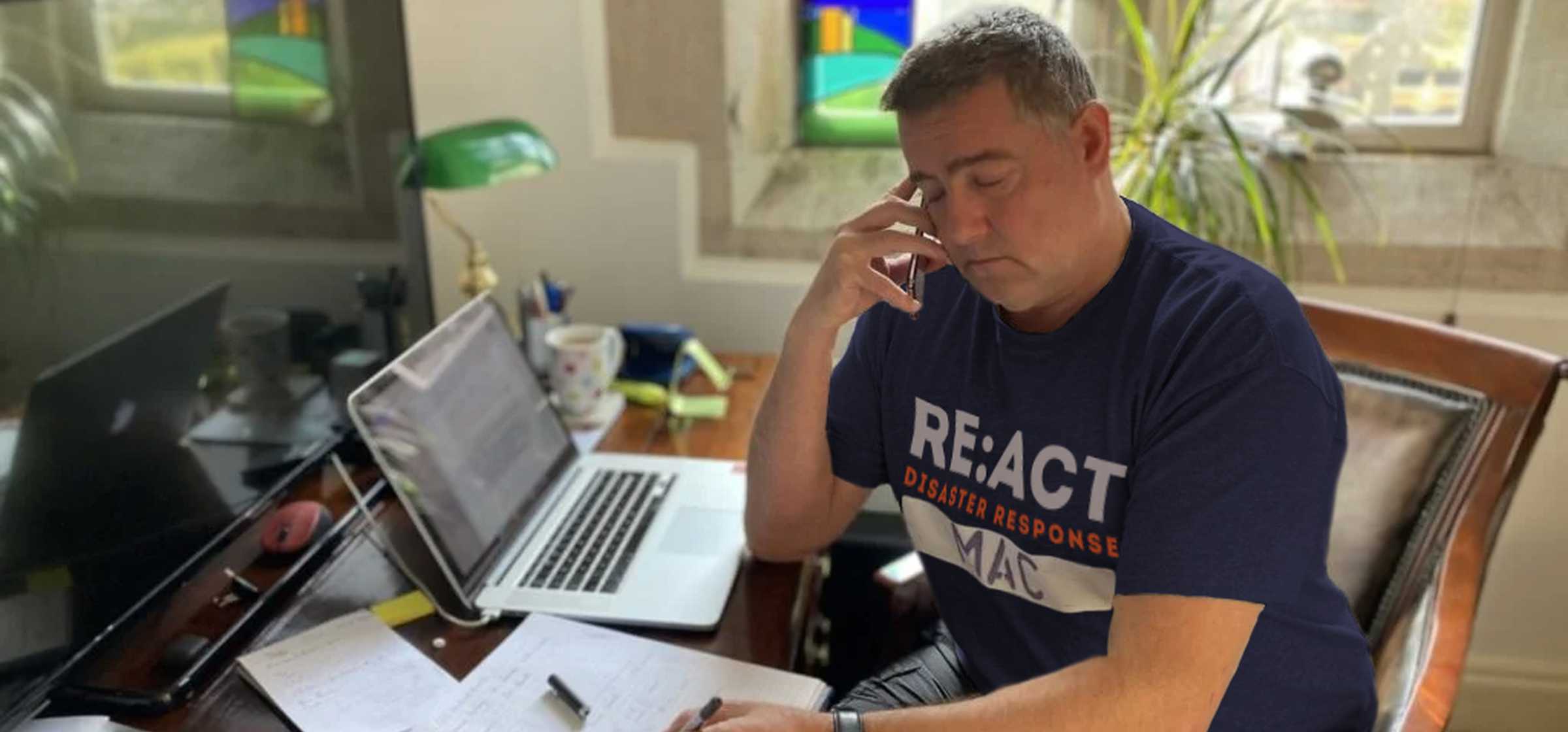Op RE:ACT: A surreal first deployment

Posted by Gordon Mackenzie 07th May 2020 RE:flections
Estimated Reading Time: 4 mins
I am a veteran, a former Royal Marine, and for the past 30 years I’ve worked in the corporate sector running two performance management consultancies. The work kept me busy (often too busy) but left me unfulfilled. I wanted a greater sense of purpose, a new challenge. I needed to serve, to make a difference. It’s the familiar veterans’ tale.

Last year, at 55, I decided a change was needed. I sold one of my businesses and became a non-executive director of the other. I’d freed up more time – but now what?
I met Rich Sharp, CEO of RE:ACT and a former Marine too, over a coffee in May 2019. Rich had also entered the corporate world after the Marines and unsurprisingly had a similar story to mine. Rich had found his renewed purpose. I was still searching.
Over that coffee, as Rich spoke passionately about RE:ACT and how much it meant to him personally, I knew I had also found mine. What better feeling than to help the most desperate communities stricken by disaster and to be among those who share your values, your determination to do good, your need to be part of something bigger than yourself. RE:ACT had me at hello!
I signed up immediately and began my induction training, going through the programmes until I completed my Operational Leadership Course (OLC). I eagerly awaited my first deployment to some far-flung, hot and uncomfortable destination at a moment’s notice.
Little did I know that my first opportunity to serve again would be from my home office supporting operations in Hampshire and the Thames Valley as part of Op RE:ACT, RE:ACT's response to COVID-19.
For weeks, as the COVID-19 pandemic worsened, RE:ACT had been preparing and Rich was telling influencers and decision-makers in government and the voluntary sector how much we could support and help.
Responders were on standby. We were ready, waiting, eager. These were uncharted waters – an international disaster response charity looking to deploy on home soil. Now we were part of the government ‘machine’, one of many parts, and as we discovered, some parts move slower than others.
What does a rapid disaster response charity do in such a situation?
We acted. Fast.
On Saturday 28th March, with no government funding or decision forthcoming, Rich announced RE:ACT’s mobilisation and Op RE:ACT was launched. The day before, Rich had stood us down. On the drive home he’d changed his mind. If this was the international arena RE:ACT would have responded by now, he reasoned. This was no different – people needed our help.
I was one of 15 Responders on the call with Rich that Saturday as he explained our mission and intent: “We need to demonstrate leadership and drive the sector to move quicker.”
This was one of many brave decisions Rich has made in his life and one we all supported. We knew the charity’s survival was at stake and this would leave us incredibly exposed financially. But that was nothing new either. We are a small independent charity reliant solely on private donations – our finances have never been secure; our future has always been in jeopardy. What keeps us going is our incredible people; their grit, their passion, their resourcefulness. We were always going to put up a good fight.
We moved at pace. The 15 Responders on that call were deployed as Regional Liaison Officers to cover the UK and provide situational awareness, mapping our structure to the Military Command Structure which was also being stood up at the time. We established a National Volunteer Coordination Cell (NVCC) at our Headquarters in Chilmark, Wiltshire, to report back unmet needs and match them to resources. We put a call out to the untapped and highly-skilled Veteran Community to come forward as volunteers.
My first weeks as an RLO were about relationship building. Internationally our reputation and track record precede us. Domestically, no one knew us. Before we could do anything, we had to build trust. Working remotely, this was a slow and painstaking task, however the veteran link with the military cannot be underestimated and this fast-tracked our progress.
By developing the military relationship quickly I found I was in many cases sponsored or invited in and trusted with information no other charity or voluntary sector organisation had. When a Military Assistance to the Civil Authority request (MACA) came in, the UK Military Strategic Joint Command (SJC) at Aldershot would assess it for suitability, and any tasks deemed inappropriate or outside their remit were passed to me to see if TRUK could fulfil the need.
This was the pattern established by all RE:ACT Liaison Officers. RE:ACT was fully in the game.
As the deployment progressed I found that we were called on more and more as our reputation grew and we impressed with our quick turnaround. More tasks kept spinning our way. When Ron Dennis turned to the military to help with his Salute The NHS initiative, the military turned to us.
In just six weeks Op RE:ACT has achieved an astonishing amount. Currently we have around 30 live tasks up and down the country; we’ve delivered over a million items of PPE, over 100,000 meals to NHS staff and vulnerable communities, and recruited over 5,000 spontaneous veteran volunteers.
It has been surreal to be in the comfort of my own home whilst others are rolling up their sleeves and getting stuck in. But I can look at all we’ve achieved and know I’ve played a part and that fills me with enormous pride. Not only has RE:ACT given me new meaning and purpose but also allowed me to serve again and make a difference.
Even for a charity such as ours, used to punching well above its weight, it’s an incredible feat.
